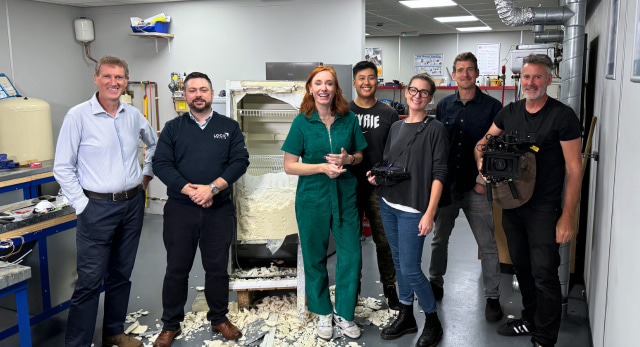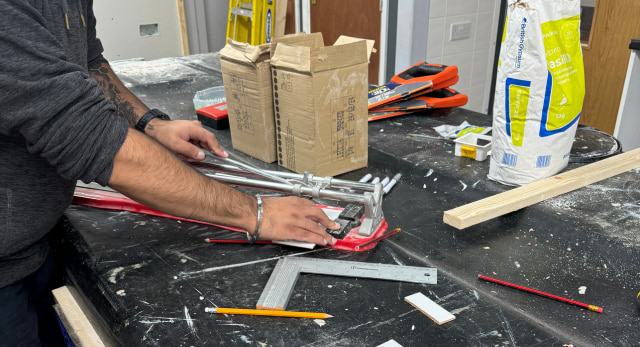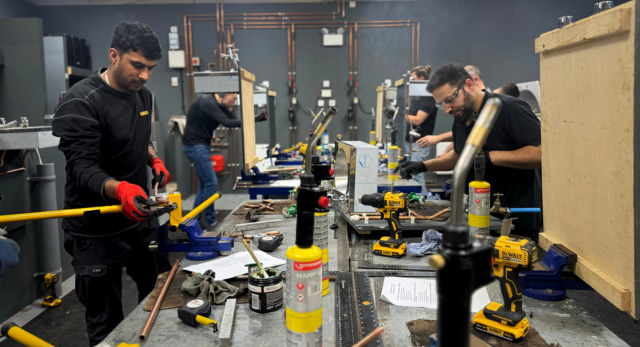Last week, BBC Two aired Series 3, Episode 2 of The Secret Genius of Modern Life, where Professor Hannah Fry delved into the fascinating world of fridges. For those who missed it, this episode was a brilliant insight to how these everyday appliances work, their historical significance, and their impact on modern life. At Logic4training, we were thrilled to have played a part in bringing this episode to life.

Back in September 2024, our trainer Mark Williams spent a day with Hannah Fry and the BBC crew, dismantling a fridge and explaining its components. Here’s a behind-the-scenes look at what went down and why fridges are much cooler than you might think!
A Day with the BBC: Taking Apart a Fridge
When the BBC approached Logic4training for assistance with their fridge episode, we jumped at the chance. Our trainer Mark Williams welcomed Hannah Fry and the film crew to our training centre, where they got hands-on with an old fridge destined for recycling. Armed with tools and curiosity, Hannah set out to uncover the secrets hidden within its insulated walls.
Mark guided her through the process, explaining each component’s role in the refrigeration cycle. From the compressor (the heart of the fridge) to the evaporator coils that cool your milk and eggs, every part was meticulously explored. The day was filled with laughter, learning, and a touch of chaos—Hannah’s enthusiasm for taking things apart was infectious!
How Does a Fridge Work?
Fridges operate on a principle known as the vapour compression cooling cycle. Here’s a simplified breakdown:
- Compressor: The refrigerant starts as a low-pressure gas and is compressed into a high-pressure, high-temperature vapour.
- Condenser: This vapour travels through coils at the back or bottom of the fridge, releasing heat into the surrounding air and condensing into a liquid.
- Expansion Valve: The liquid refrigerant passes through this valve, dropping in pressure and cooling significantly.
- Evaporator: Inside the fridge, the refrigerant absorbs heat from stored food as it evaporates back into a gas.
- Repeat: The cycle begins again as the refrigerant returns to the compressor.
This ingenious system essentially moves heat from inside your fridge to the outside environment, cheating physics to create cold spaces.
The Social Impact of Refrigeration
The episode didn’t just focus on science; it highlighted how fridges revolutionised daily life. Hannah explained how affordable refrigeration liberated households from daily grocery shopping and transformed food storage globally. It’s hard to imagine life without this modern convenience!
Why Refrigeration Matters to Us
At Logic4training, we specialise in equipping engineers with the skills to maintain and repair refrigeration systems. Fridges may seem simple on the surface, but their inner workings are complex and require expertise to ensure efficiency and safety. Faulty fridges pose risks like fire hazards due to flammable refrigerants, a reminder of why proper training is essential.
Our involvement in The Secret Genius of Modern Life underscores our commitment to educating both professionals and the public about these critical appliances.
Catch Up on BBC iPlayer
If you haven’t seen this episode yet, it’s available now on BBC iPlayer. Watch as Hannah Fry takes apart fridges with glee while uncovering their scientific brilliance. Whether you’re fascinated by engineering or just curious about what keeps your ice cream frozen, this episode is worth your time.

Join Us at Logic4training
Inspired by what you saw? Whether you’re looking to start or advance your career in refrigeration, Logic4training offers refrigeration courses tailored to industry needs. Learn more about how fridges work or explore opportunities in HVAC systems by visiting our website today.
Let’s keep things cool—literally!









